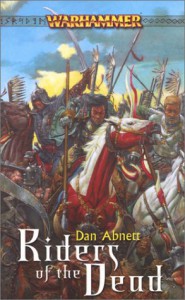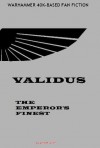SPOILER ALERT!
Riders of the Dead (Warhammer novel)
 The Year that no one forgets...
The Year that no one forgets...The book was about two demilancers of the Empire who went to war and got separeted. It was the year of 2521 and a full scale war was goin' on. One of the empire armies march north and face the northern tribes. The northern tribes were more and outnumbered then and most of them fell. Some were made captives to their own sports and others fled south. And this is how our story begins.
Warhammer fantasy is a bit different from the sort of light-touch fantasy common in the American market. The emphasis is on the intricacy of the Warhammer setting, and the endless wars that plague its inhabitants. (As one person I knew said, Forgotten realms it's for juvinile and Warhammer / Warhammer 40k it's for young adults and adults...)
Games Workshop draws heavily on the history of Europe for its setting's richness, and Abnett does the same with RIDERS OF THE DEAD.
Dan Abnett portraits exclently the Viewpoint of Empire, of the Kislevian's (who are the empire allies but seen as under-developed people), and the Northers (Norsca) who are the antognists of the empire. The bulk of the novel takes place in Kislev, Warhammer's fantastic analog not only for medieval Russia but somethings by poland and the golden horde (mongol) and knowledgeable readers will find many familiar names and concepts buried among the sheer invention.
Dan Abnett made a story about two different friends,(Karl Vollen and Gerlach Heileman) if you can call them it. Gerlach is a young man of privilege destined for great things. His boyhood friend, Karl, had the benefit of patronage by Gerlach's household, but his low birth means he'll never amount to much in the scheme of things.
In the book they go to drastic changes. Karl, captured by the barbaric Kurgan, is initiated into dark rites and the religion of bloody slaughter. Meanwhile, the arrogant Gerlach becomes an enlightened warrior in the company of a humble troop of Kislevite lancers. Abnett takes his time progressing these parallel tales, and though the journeys both men undertake are those of internal transformation, there's plenty of gory battle to punctuate the introspection.
Dan Abnett portraits exclently the Viewpoint of Empire, of the Kislevian's (who are the empire allies but seen as under-developed people), and the Northers (Norsca) who are the antognists of the empire.
In the end I personally admire each and every other kingdom. The norcsa who aren't that all chaos and mayhem, the kisvelians who live in the stepps and aren't that under-develped but rather code and faith followers. I like the all book. If there is a part where I don't feel so excited its the end. I guess it was rather precipated. But the end after the last battle was tottaly unpredictable. (It remind me of Dan Abnett's Double Eagle)
If you want to start reading Warhammer you can start anywhere since they are all great books. But Abnett's book are just marvelous. I would recomend this one to people who love a book about war (and not afraid of and character development.












